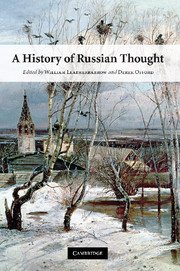Book contents
- Frontmatter
- Contents
- Preface
- List of contributors
- Dates, transliteration and other conventions
- Dates of reigns
- Russian titles of journals, newspapers and miscellanies
- PART I CONTEXT
- 1 Introduction
- 2 The political and social order
- 3 Russian intelligentsias
- PART II INTELLECTUAL CURRENTS
- PART III THEMES AND CONSTRUCTS
- PART IV THE AFTERLIFE OF CLASSICAL THOUGHT
- Biographical details of thinkers and writers
- Selected bibliography
- Index
2 - The political and social order
Published online by Cambridge University Press: 05 June 2012
- Frontmatter
- Contents
- Preface
- List of contributors
- Dates, transliteration and other conventions
- Dates of reigns
- Russian titles of journals, newspapers and miscellanies
- PART I CONTEXT
- 1 Introduction
- 2 The political and social order
- 3 Russian intelligentsias
- PART II INTELLECTUAL CURRENTS
- PART III THEMES AND CONSTRUCTS
- PART IV THE AFTERLIFE OF CLASSICAL THOUGHT
- Biographical details of thinkers and writers
- Selected bibliography
- Index
Summary
The history of Russian thought used to be fashionable. Indeed, in the 1950s and early 1960s it occupied centre stage in English-language writing about Russian history. While Isaiah Berlin popularised it in Britain, in the United States Nicholas Riasanovsky published on Slavophiles, Leopold Haimson on the ideological origins of Bolshevism, Marc Raeff on the ideas of the early nineteenth-century bureaucrat Speransky, Richard Pipes on the conservative Karamzin and Martin Malia on the liberal and proto-socialist Herzen. Then, from the end of the 1950s, new academic exchange programmes permitted a few western scholars to study in the Soviet Union. Those among them who gained admission to Soviet archives no longer had to confine their attention to the printed works of individual thinkers. When the studies of this new generation of scholars began to appear in print, the history of ideas began to take a back seat. Institutions and social groups, the prime concern of state archives, became a more frequent subject of anglophone monographs on Russian history than the intellectuals who had previously been in the ascendant. After the fall of the Soviet Union, when Russian archives came to be much more readily accessible to non-Russian scholars, concern for the history of ideas diminished still further. Thus anglophone work on Russian history since the Second World War may be said to consist of a phase of concentration on Russian thought followed by a phase of concentration on Russian politics and society.
- Type
- Chapter
- Information
- A History of Russian Thought , pp. 17 - 43Publisher: Cambridge University PressPrint publication year: 2010

